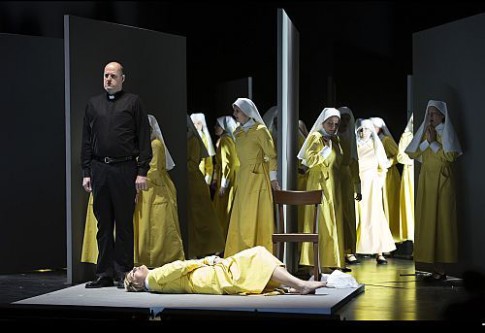Prokofiev: The Fiery Angel, Komischen Oper Orchestra and Chorus, Henrik Nánási (conductor), Berlin Komische Oper, 23.1.2014. (JMI)

Cast:
Renata: Svetlana Sozdateleva
Ruprecht: Evez Abdulla
Inquisidor: Jens Larssen
Innkeeper: Christiane Oertel
Knecht: Hans-Peter Scheidegger
Abbess: Xenia Vyaznikova
Jakob Glock: Christoph Späth
Agrippa/Mephistopheles: Dmitry Golovnin
Faust: Alexey Antonov
Matthias: Bernhaard Hansky
New production:
Direction: Benedict Andrews
Sets: Johannes Shütz
Costumes: Victoria Behr
Lighting: Diego Leetz
This performance of The Fiery Angel was excellent, with an outstanding musical reading and a superb stage show. The cast was not quite at the same level, but this is expected by those who attend the Komisch Oper in Berlin where there is a house company without big names, similar to what happens at Vienna Volksoper or at Munich Gärtnerplatz.
The Fiery Angel is a great opera by Sergei Prokofiev that had its premiere in 1955 in Venice. It’s surprising that works by Prokofiev are not staged more frequently in the big houses. The Fiery Angel, in a production like this one and with strong musical direction, is worthy of the best opera theatres in the world.
This is a new production by Australian Benedict Andrews, a theater director with extensive experience who has lately devoted his attention to opera. The stage work is a real find and an example of what can be achieved with imagination, good taste and deep study of a score. It employs a revolving stage where there are only some wood panels that are moved for the different scenes plus a few props. Mr. Andrews’ use of extras to fix and remove the sets – all of them dressed like the protagonists of the opera, Renata and Ruprecht – is outstanding and lends a more disturbing, dreamlike aspect to the production. The costumes are colorful and attractive, well suited to the plot of the opera, particularly in the final scene in the convent. There is also excellent lighting work.
The stage direction is spectacular. Mr.Andrews brings the action up to modern times but is very respectful of the libretto, and he demonstrates a thorough knowledge of the score. It is a great job in the service of the music. The direction of the actors is magnificent, both with the soloists and with the extras, stagehands, children and choir. It’s a true example of what a modern stage production should be.
The musical direction was entrusted to Henrik Nanasi. He is a frequent presence today in major opera houses which is not surprising: he is an excellent conductor. The Fiery Angel needs a baton of the highest level, and Mr. Nanasi has achieved a personal triumph. Under him the orchestra sounded much better than what I’ve heard from them in the past.
Renata, the protagonist of the opera, was soprano Svetlana Sozdateleva, who gave a very convincing portrayal of a woman possessed by the devil. This character is one of the most difficult in any opera, since she virtually sings throughout the entire opera, and on top of this she needs to be a remarkable actress. Overcoming these difficulties has an exceptional merit, and Ms. Sozdateleva got it right. In purely vocal terms her soprano is not too attractive, and she was rather tight at the top on more than one occasion, but Renata is not a part for many sopranos.
Ruprecht was played by baritone Evez Abdulla, who offered a good performance. His voice has an attractive timbre, and he is also a good interpreter. If he improves his projection, he could become a sought-after baritone.
Jens Larssen was a well-suited interpreter of the Inquisitor and of the silent role of Count Heinrich. There was also a good performance by tenor Dmitry Golovnin as Mephistopheles and the magician Agrippa.
The secondary characters were faultless in all cases.
The theater was at about 90% of capacity. The audience gave a very warm reception to the artists in the final bows, with the biggest ovations for Henrik Nanasi and Svetlana Sozdateleva .
José M. Irurzun